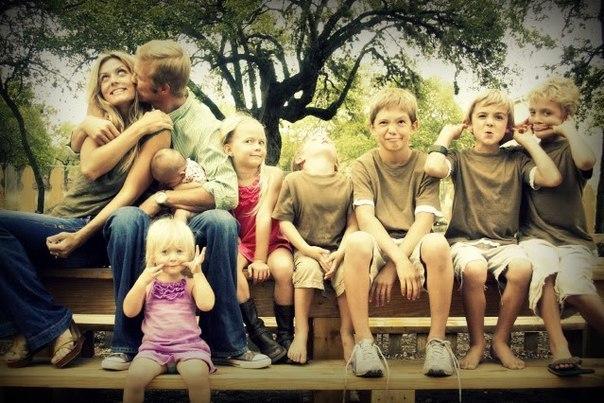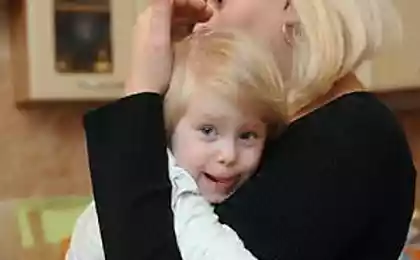522
Harmony large families
Large families mean for children's health, development and financial benefits
The last five years I live a weird double life. Even triple life.
On the one hand, I'm a television journalist, travels the world in search of troublemakers: Afghanistan, Iraq, Lebanon, Libya. On the other hand, I have a father who helps his wife to collect school lunch for half a dozen of our children.
Third, but not last, I am a researcher, has undertaken to Commission the Institute to seek out in dozens of social research evidence that childhood with a sister or brother has its advantages.

Write about the benefits of large families may seem a strange occupation for a parent, burdened with six-time brood. In the end, even brad pitt and Angelina Jolie admit that they are struggling with six children.
For increasingly popular choice to have only one child costs a lot of pressures to careful family planning: the cost of housing, cost of care, lost career opportunities.
But although lack of funds is really a deterrent to anyone who wants to have her first child and who cannot afford the increase in the family another reason may be lack of accurate information.
Each year, press center, financial companies release a new, growing at a rate of inflation of figures. Some even come up with such pseudo-scientific terms as "the cost of the second child."
But nobody takes into account how a large family saves. The clothes and toys bought for one child, pass on the inheritance to another. What is the average cost per child falls because the children share everything from home heating to the water in the bathroom. Parents pay less for entertainment, if children can entertain each other. In many places, from schools to parks, and offers discounts for the second child.
Thus, with the help of the Swedish researcher Teresa Wallin I intend to collect data representing the question "have another?", in a new light.
Recent research suggests that the presence of a brother or sister can prevent food allergies, multiple sclerosis and some types of cancer.
The most amazing information comes from medical research. It is well known that exchanging germs in childhood and reinforce the immune system, children get protection from atopic dermatitis, hay fever and eczema.
But recent achievements suggests that a child with a sibling can prevent food allergies, multiple sclerosis and some types of cancer. For reasons that have yet to explore, these advantages do not relate to the kids, just spending time together and sharing germs, like in kindergarten.
The risk of other "epidemics" of today's children, obesity and depression is also potentially reduced in large families. A large percentage of studies from around the world shows that the more child's brothers and sisters, so it is slimmer. Simply put, brothers and sisters help the child to burn fat.
With each subsequent brother/sister child an average of 14% less complete
One of the conducted in the U.S. studies polished the resulting analysis data to a remarkably accurate figures: with each subsequent brother/sister child an average of 14% less complete. Absurd? We can smile over such findings, not yet aware that no one in the medical community has never suggested that the presence of a brother or sister made anyone fatter.
There is nothing complicated. If you compare what is comparable, regardless of the welfare of the family, children growing up with brothers and sisters, often have a more stable psyche. Obviously, this is a strong generalization. The world is full of happy individuals.
But if you delve into large amounts of data, reveal trends that cannot be ignored. As for experiences, which are based most of the statistics, for example, events such as death or divorce, there is a clear relationship. It is logical that when parents split up or die, the child will be easier if he has a brother or sister to which he may appeal. This solidarity for life. In the end, a brother or a sister is forever, not just for childhood.
In fact, the politicians engaged in the issue of care for the elderly must open their eyes to other areas, such as the quicksand in the number of modern family. At the end of the 20th century the common notion among sociologists was that for society as a whole doesn't matter that more and more people choose to have only one child. Now that's in question.
Whether there was a new factor in the discussion of the welfare of the country, the role of siblings in caring for the elderly? Will the economy of the country in which less creative middle children are just as competitive? How difficult it will be for governments to impose war, if a greater number of parents do not want to see their only child is sent to the front?
Brothers and sisters play the role of a driving force in personality development
Summarizing, we can say that in the last decade, scientific understanding of the role of siblings has evolved. They play the role of a driving force in personality development. And where such academics like Tony Falbo, argued that to be born an only child in the family is to win in life's lottery, now research is going in the other direction.
Turning reports of serious scholars have refuted the idea that family size is a choice, not entailing consequences.
Researchers have shown that children who have a brother or sister will be softer and more emotionally secure than the only children in the family. They will overcome important milestones in development, such as starting to walk and talk faster than those who did not have the example of our brothers and sisters before my eyes.
Some of the recent discoveries show that those who have a brother or sister, have more developed language skills and successfully pass the exams. This is truly a revolutionary discovery. For many decades in academic circles, it was assumed that the less children the better.
Get too many kids – and you will not be able to collect resources for one gifted child. In fact, for parents who can't stop hovering over the child and load in a pressurized offspring, a second child can be the antidote to hyperopic.
"There is a danger to strangle the child too much pressure," writes Amy Chua, author of the bestseller "Battle hymn of the mother tiger" (The Battle Hymn of the Tiger Mother), the mother is so strongly tuned to squeeze out of the child everything that she planned daily lessons of playing the violin, even on holidays. The presence of another child, says she has dulled her precise, like a laser, focus.
It was difficult for us to perceive pregnancy differently than a blessing
What about my children? As they feel the quality of the materials laboratory for the study of brothers and sisters? The eldest daughter, who is only 14, has already announced that if she does have children, their number will be limited.
My wife and I, too, initially treated fertility skeptical. But, having experienced the difficulties in trying to have a second child, it was difficult for us to perceive pregnancy differently than a blessing.
As were growing our family, making required machine larger and fewer holidays, we began to share the views attributed to Elizabeth Longford, the historian and Catholic, mother of 8 children. When she asked the question, why so many, she replied that, since children are so different, curiosity prompted her to figure out the limits of genetic diversity.
We realized that a big family has awakened in us the inner anthropologist. Some friends shudder at the sight of controlled chaos in our house, but my wife likes the abundance of human communication. We are Directors of our own daily soap Opera.
Author Colin The Title (Colin Brazier)
Translation Of Irina's Gift
P. S. And remember, just changing your mind — together we change the world! ©
Join us in Facebook , Vkontakte, Odnoklassniki
Source: alpha-parenting.ru/2015/11/23/garmoniya-mnogodetnyih-semey/
The last five years I live a weird double life. Even triple life.
On the one hand, I'm a television journalist, travels the world in search of troublemakers: Afghanistan, Iraq, Lebanon, Libya. On the other hand, I have a father who helps his wife to collect school lunch for half a dozen of our children.
Third, but not last, I am a researcher, has undertaken to Commission the Institute to seek out in dozens of social research evidence that childhood with a sister or brother has its advantages.

Write about the benefits of large families may seem a strange occupation for a parent, burdened with six-time brood. In the end, even brad pitt and Angelina Jolie admit that they are struggling with six children.
For increasingly popular choice to have only one child costs a lot of pressures to careful family planning: the cost of housing, cost of care, lost career opportunities.
But although lack of funds is really a deterrent to anyone who wants to have her first child and who cannot afford the increase in the family another reason may be lack of accurate information.
Each year, press center, financial companies release a new, growing at a rate of inflation of figures. Some even come up with such pseudo-scientific terms as "the cost of the second child."
But nobody takes into account how a large family saves. The clothes and toys bought for one child, pass on the inheritance to another. What is the average cost per child falls because the children share everything from home heating to the water in the bathroom. Parents pay less for entertainment, if children can entertain each other. In many places, from schools to parks, and offers discounts for the second child.
Thus, with the help of the Swedish researcher Teresa Wallin I intend to collect data representing the question "have another?", in a new light.
Recent research suggests that the presence of a brother or sister can prevent food allergies, multiple sclerosis and some types of cancer.
The most amazing information comes from medical research. It is well known that exchanging germs in childhood and reinforce the immune system, children get protection from atopic dermatitis, hay fever and eczema.
But recent achievements suggests that a child with a sibling can prevent food allergies, multiple sclerosis and some types of cancer. For reasons that have yet to explore, these advantages do not relate to the kids, just spending time together and sharing germs, like in kindergarten.
The risk of other "epidemics" of today's children, obesity and depression is also potentially reduced in large families. A large percentage of studies from around the world shows that the more child's brothers and sisters, so it is slimmer. Simply put, brothers and sisters help the child to burn fat.
With each subsequent brother/sister child an average of 14% less complete
One of the conducted in the U.S. studies polished the resulting analysis data to a remarkably accurate figures: with each subsequent brother/sister child an average of 14% less complete. Absurd? We can smile over such findings, not yet aware that no one in the medical community has never suggested that the presence of a brother or sister made anyone fatter.
There is nothing complicated. If you compare what is comparable, regardless of the welfare of the family, children growing up with brothers and sisters, often have a more stable psyche. Obviously, this is a strong generalization. The world is full of happy individuals.
But if you delve into large amounts of data, reveal trends that cannot be ignored. As for experiences, which are based most of the statistics, for example, events such as death or divorce, there is a clear relationship. It is logical that when parents split up or die, the child will be easier if he has a brother or sister to which he may appeal. This solidarity for life. In the end, a brother or a sister is forever, not just for childhood.
In fact, the politicians engaged in the issue of care for the elderly must open their eyes to other areas, such as the quicksand in the number of modern family. At the end of the 20th century the common notion among sociologists was that for society as a whole doesn't matter that more and more people choose to have only one child. Now that's in question.
Whether there was a new factor in the discussion of the welfare of the country, the role of siblings in caring for the elderly? Will the economy of the country in which less creative middle children are just as competitive? How difficult it will be for governments to impose war, if a greater number of parents do not want to see their only child is sent to the front?
Brothers and sisters play the role of a driving force in personality development
Summarizing, we can say that in the last decade, scientific understanding of the role of siblings has evolved. They play the role of a driving force in personality development. And where such academics like Tony Falbo, argued that to be born an only child in the family is to win in life's lottery, now research is going in the other direction.
Turning reports of serious scholars have refuted the idea that family size is a choice, not entailing consequences.
Researchers have shown that children who have a brother or sister will be softer and more emotionally secure than the only children in the family. They will overcome important milestones in development, such as starting to walk and talk faster than those who did not have the example of our brothers and sisters before my eyes.
Some of the recent discoveries show that those who have a brother or sister, have more developed language skills and successfully pass the exams. This is truly a revolutionary discovery. For many decades in academic circles, it was assumed that the less children the better.
Get too many kids – and you will not be able to collect resources for one gifted child. In fact, for parents who can't stop hovering over the child and load in a pressurized offspring, a second child can be the antidote to hyperopic.
"There is a danger to strangle the child too much pressure," writes Amy Chua, author of the bestseller "Battle hymn of the mother tiger" (The Battle Hymn of the Tiger Mother), the mother is so strongly tuned to squeeze out of the child everything that she planned daily lessons of playing the violin, even on holidays. The presence of another child, says she has dulled her precise, like a laser, focus.
It was difficult for us to perceive pregnancy differently than a blessing
What about my children? As they feel the quality of the materials laboratory for the study of brothers and sisters? The eldest daughter, who is only 14, has already announced that if she does have children, their number will be limited.
My wife and I, too, initially treated fertility skeptical. But, having experienced the difficulties in trying to have a second child, it was difficult for us to perceive pregnancy differently than a blessing.
As were growing our family, making required machine larger and fewer holidays, we began to share the views attributed to Elizabeth Longford, the historian and Catholic, mother of 8 children. When she asked the question, why so many, she replied that, since children are so different, curiosity prompted her to figure out the limits of genetic diversity.
We realized that a big family has awakened in us the inner anthropologist. Some friends shudder at the sight of controlled chaos in our house, but my wife likes the abundance of human communication. We are Directors of our own daily soap Opera.
Author Colin The Title (Colin Brazier)
Translation Of Irina's Gift
P. S. And remember, just changing your mind — together we change the world! ©
Join us in Facebook , Vkontakte, Odnoklassniki
Source: alpha-parenting.ru/2015/11/23/garmoniya-mnogodetnyih-semey/























